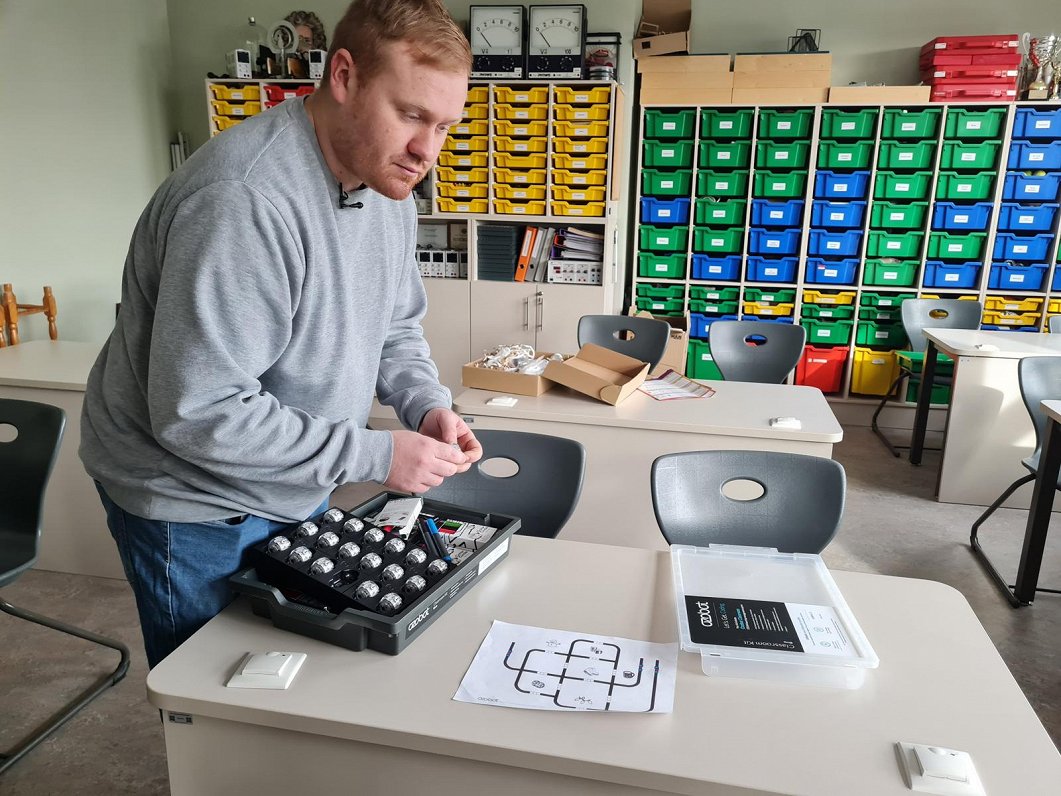Year after year, the Latvian education system shows lower teacher pay than other OECD member states. Between 2015 and 2021, the dramatic wage gap started to decline. On average in all OECD countries, teachers' salaries increased by 18%, while in Latvia – by 59%. However, the actual salaries of educators in Latvia remain low.
The rules on teacher pay were adopted in 2016. Since then, salaries for teachers have been calculated using a formula that takes into account the salary rate, the number of hours worked per week, and the workload.
Solveta's story
The physics and engineering teacher, Solveta Logina, went to Balvi municipality 20 years ago since there as a lack of teachers. Logina has never worked in one school for long since schools have always undergone reforms. Although the lack of physics teachers is long-standing in many schools, she is generally requested to work part-time. Last year, however, she was particularly busy and unappreciated at the same time.

"Last year was horrible. There were a lot of hours. On Mondays seven classes, then I had a window in which I had to teach engineering lessons from October to December on Zoom, but how can you teach engineering on Zoom? It's not realistic at all. I had eight classes on Tuesday. On Wednesdays I was driving so that I was in Rugāji at eight o'clock in the morning, then I had seven classes remote. Then I had eight lessons here. And then on Friday, six lessons. I thought it was the downfall of my life. One moment I stopped, wrote my resignation, said I couldn't. But at the same time, the principal says, no, you'll take this and that," Solveta said.
Solveta worked a lot more than one load, 40 contact lessons per week in three different schools. “I got over a thousand [in pay], I'm going to be honest. But it's fallen now. On Mondays I don't go to work, but the rest of the days average nine classes. I'm getting €920, I won't say how much in which school,” the teacher said.
At least €100 of that salary is spent on fuel to drive out to the various institutions in which she works.
In addition to contact hours, the teacher will spend additional time preparing, correcting, and tutoring. Solveta doesn't blame any colleagues because she is well aware that they have no other options. If Solveta didn't agree to work, the school would risk inconveniences that could ultimately lead to closure.
Kārlis' story
Government officials say teachers' salaries will rise as local governments tidy up the network of schools. The good examples are Ogre, Alūksne, Jelgava.
In Jelgava, thirty-year-old environmental engineer Kārlis Daģis is very satisfied with his job.

“I feel appreciated. Both emotionally and materially. “t's not that I could complain right now,” said the Jelgava State Gymnasium teacher.
He teaches 28 classes in physics and 5 classes with his assigned form. His pay rate is €14.40 per hour. Along with a variety of bonuses after tax, he gets €1600. Next year, his salary is likely to be even higher, qualifying for a higher grade of quality.
“For the third year, I've got a full-time job at the school, we're looking for reinforcements. Come, there's a lot to do, there's a lot of classes to teach, [..] I personally don't have to look for other jobs to pick up that baseload,” Kārlis said.
Why different wages?
So two physics teachers, Kārlis and Solveta, have significantly different salaries and loads. Why is that?
Actual wages depend on the type of educational establishment, the type of program, the location, and the benefits of the municipality.
While Solveta travels around three small schools and is teaching small groups, Kārlis works in a large State gymnasium where he teaches a lot of children.
In addition, Kārlis is particularly rewarded for excellent achievements. The work of Solveta is not specially rewarded.
How do educators get equal salaries? And will sorting the school network mean wage increases, as promised?
“It's very difficult for me to predict. It depends on which schools the teacher is going to and what load the teacher is being offered,” said Iveta Pāže, head of the Valmiera Municipality Education Board.
“Of course, in the city and in the suburbs, where maybe the class is higher in the number of children, the pay is higher, yes,” said Sandra Kaufmane, principal of the primary school in Brenguļi.
"This year we got three teachers from the school that closed last year, and we're happy about it. But at the same time, these utopian phrases that we will shut down small schools and all will come to cities – it is an absolute utopia.
"We as Latvians are settled, we do not change our lives like in the south every five years, we have a very important place where we are rooted. If there is a road system, if there is compensation for fuel, then, of course, there is a possibility of coming from rural areas to town, working, and going home in the evening. But not the way it is now. Now it's a utopia," said Inta Korņējeva, director of the Draudzīgā aicinājuma 5th High School in Liepāja.
As reported, the teachers' union is planning a protest march and a three-day strike starting April 24 due to the unbalanced loads and wages in the education system.



























